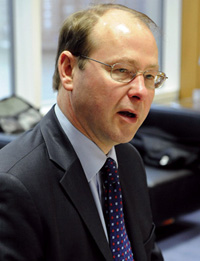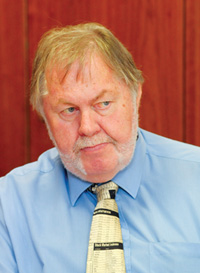Talking heads: election or selection?
Are elections the right way to create a trustee board? Some believe they only elect popular people who are not necessarily the most skilled for the job. Our panel suggests a selection process is becoming a more popular way of choosing. Four experts give their views on the trend.
Simon Baynes
Independent trustee, Capital Cranfield Trustees
Good chemistry from selection
A straightforward election sounds, on the face of it, fair and democratic – what could be wrong with that? Actually, quite a lot. While the board may be democratically elected it won’t necessarily have the right balance of skills and experience to function optimally.
Put simply, good trustees lead to good governance. Good governance leads to good outcomes for members. It follows that securing the best group of member-nominated trustees to work with employer-appointed trustees is vital.
When a board has an MNT vacancy it should be seeking someone with a set of attributes that complement the skills and experience of the existing board members. There may be many good candidates. From these the board will generally benefit most from widening the pool of experience rather than choosing a clone of existing members. Securing the right person is almost impossible by election.
And the new MNT must get on with the existing board. That is not to say they must agree all the time, or share the same background, opinions or views. But, for the board to be successful there is a certain chemistry that must work.
Who is best able to make judgments on complementary skills and personal chemistry? Experience shows it works well to have a small sub-group of the board, two or three trustees, chaired by the independent trustee.
Clive Gilchrist
Deputy chairman, Bestrustees
Better quality from selection
A recent case study in respect of one of the schemes I work with illustrates the advantages of a selection process for trustees over the traditional straightforward election. This scheme’s trustee board has included elected members for many years.
But trustee responsibility becomes more complex and onerous by the year and the expectations of the Pensions Regulator are that trustees will rise to these challenges. Against that background a simple election without screening candidates to assess their aptitude for the task is unfair on the candidate, the trustee board and the sponsor.
So, notwithstanding reservations of a minority of existing trustees, it was decided in the latest round of trustee appointments a selection process would be used. Independence of the selection panel was key; I chaired it as the independent trustee and was accompanied by an ex-trustee-chairman, known and respected by the membership, and an existing member trustee.
More than 20 candidates put their names forward, far more than for any election. The quality of the candidates was excellent, including retired and deferred senior managers who may have been reluctant to subject themselves to an election as they might have failed to attract the popular vote. The shortlist comprised three candidates, all of whom would have made good trustees.
We had a difficult choice, but the result was a clear success. Selection produces a better quality of applicant.
Janet Williamson
Senior policy officer, TUC
Elections bring safeguards
Member-nominated trustees play a vital role in the governance of pension funds. They give members a direct voice in running their pension fund and ensure the trustee body always acts in the interests of beneficiaries.
The requirement for one-third of pension fund trustees to be nominated by pension fund members was put in place following the scandal in which Robert Maxwell raided his employees’ pension funds to further his corporate ambitions. When this fell apart his employees lost both their jobs and their pensions. There have been no equivalent scandals since the requirement was put in place.
MNTs must genuinely represent members. The role is herefore incompatible with being selected by the trustee board. Trustees should be selected by pension fund members, either by direct election or through other democratic routes such as trade unions.
It is sometimes argued that MNTs lack the expertise required to run pension funds effectively. The TUC refutes this assertion.
We run a network for trade union MNTs – the largest trustee network in the UK. Our annual trustee conference always demonstrates the calibre of trustees and their considerable experience and knowledge. The Pensions Regulator toolkit has also made it much easier for trustees to gain the skills they need. Any move to weaken the role of MNTs would greatly weaken trust-based pension provision.
Barry Parr
Co-chair, Association of Member-Nominated Trustees
The pros and cons of each
AMNT’s members are engaged in an ongoing debate about whether member-nominated trustees should be elected or selected, and no conclusions have yet been drawn. A straw poll indicated that in terms of how they themselves became trustees, it was about half and half.
Some see the merit of a selection process. This ensures while any member can apply, only those with the capability to carry out the role effectively join the board. This provides an opportunity to select expertise that helps complement the existing skills on the board and achieve a better balance of governance overall.
It is usual for the selection panel to include an existing MNT and an independent. All trustees can be conflicted, member-nominated as well as employer-nominated; but they should always act in the best interests of the members and beneficiaries. A selection process helps minimise the partisan flavour.
However, others believe the election of trustees is essential. Employer-nominated trustees are inextricably linked to management, so having MNTs elected by the scheme members provides an independent voice linked to the scheme membership, not management. Selection, in practice, does confer the possibility of weeding out those critical of the sponsor or who are trade union members. When scheme members elect the trustees it adds an independent voice – which often, of course, sings the same tune as the ENTs – but it is the independence that matters most.
Most Viewed
- What does Labour have in store for the pensions industry?
- LGPS latest: GLIL backers invest £475m for UK infrastructure push
- Dashboard costs rose by 23% in 2023, figures show
- Border to Coast launches UK strategy in major private markets push
- How the pensions industry can better support people with mental health problems





